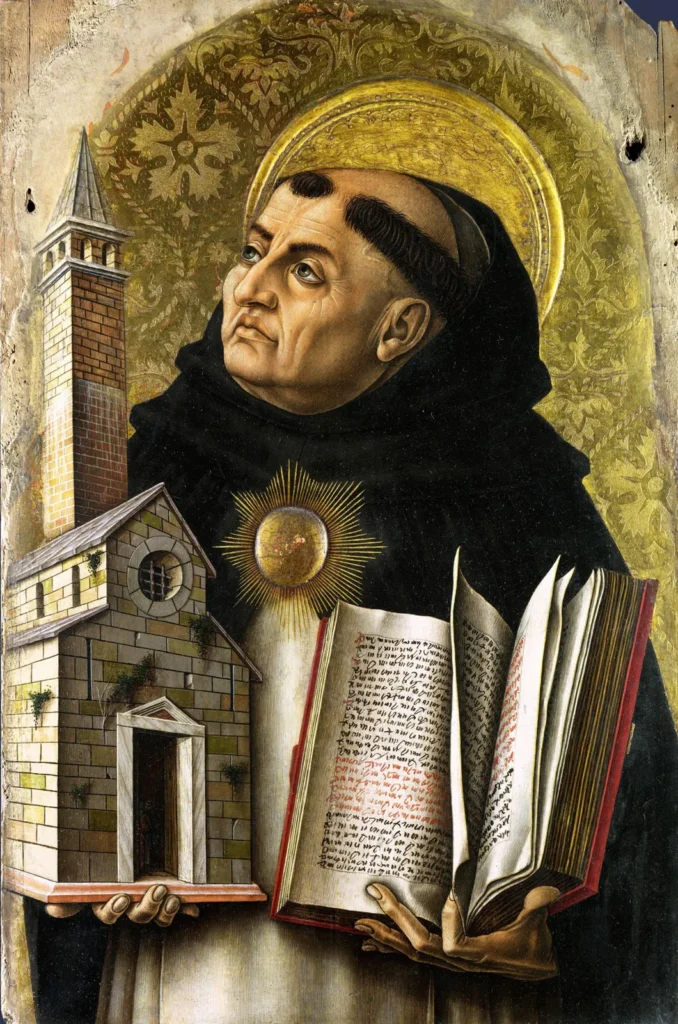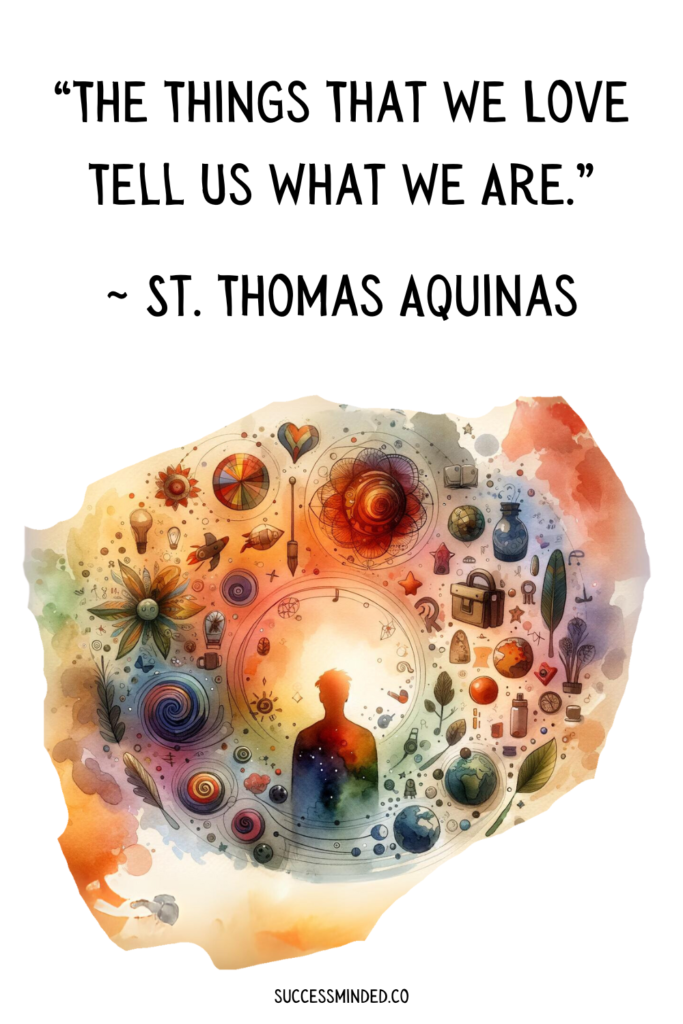Have you ever stopped to think about why you’re drawn to certain things? Why do some activities make your heart sing while others… well, not so much?
St. Thomas Aquinas, a big thinker from way back, once said, “The things that we love tell us what we are.” Quite the head-scratcher, right? But it’s true!
This isn’t just about your favorite ice cream flavor or the kind of music you jam to. It’s deeper than that. The things we’re passionate about, the stuff we can’t get enough of, they’re like little breadcrumbs leading us to who we really are. They’re clues to our true nature, our innate talents, and what we’re meant to do in this big, wild world.
So, let’s embark on a little journey together. We’re going to play detective with our own passions and see what they reveal about us. It’s like a treasure hunt, where the prize is a better understanding of yourself and perhaps a nudge in the direction of a life that’s more ‘you.’ Ready to dive in?
About the Author: St. Thomas Aquinas

Before we get into the concept this quote is trying to portray, let’s first know the man who crafted it.
St. Thomas Aquinas (1225 – 1274) was a renowned Italian Dominican friar, Catholic priest, and an immensely influential philosopher and theologian in the tradition of scholasticism. Born in Roccasecca, Italy, he is considered one of the Catholic Church’s greatest theologians and philosophers.
Aquinas was a prolific writer, and his most famous work, the “Summa Theologica,” is a testament to his intellectual depth and understanding of Christian doctrine. His writings cover a vast range of topics, from the natural law and moral theory to the relationship between faith and reason.
A hallmark of Aquinas’ thought is his synthesis of Aristotelian philosophy with Christian theology, demonstrating a remarkable ability to merge reason and faith. His philosophical approach was not merely academic; it was deeply rooted in his spiritual life and his belief in the rationality of God’s creation.
Aquinas’ influence extends beyond just religious studies; he has been a guiding figure in the development of Western philosophy and legal theory. His works have continued to be studied, debated, and revered for centuries, cementing his status as a central figure in the history of Western thought.
He was canonized as a saint by the Catholic Church and is recognized as a Doctor of the Church, a title given to saints recognized as having made significant contributions to theology or doctrine through their research, study, or writing. St. Thomas Aquinas’ teachings and writings continue to be a cornerstone in the study of theology, philosophy, and ethics.
And now, to the main part, you’ve been waiting for:
How Our Loves Point to Our True Self

It’s Not Just a Hobby, It’s a Hint
Have you ever wondered why you’re so drawn to certain activities? Like, why can you spend hours painting, playing music, or even organizing things (hello, closet warriors)? Well, here’s a thought: these aren’t just hobbies. They’re reflections of your innate strengths and talents. Love singing in the shower or karaoke nights? Maybe there’s a musical genius in there waiting to be discovered.
What Captivates You Speaks Volumes
The things that hold our attention, the issues and topics we can talk about for hours, they’re not random. They’re like neon signs pointing to our underlying values and sensibilities. For instance, if you’re always fired up about environmental issues, or you can’t stop advocating for animal rights, it’s not just a phase. It’s a reflection of your core beliefs and philosophies.
Joy as a Compass
There’s a reason why certain experiences make us feel alive. It’s because they align with our deepest purposes. Think about a teacher whose eyes light up in the classroom or a doctor who finds fulfillment in healing others. These aren’t just jobs; they’re extensions of who they are. The things that fill us with joy and satisfaction are often the things we’re meant to pursue.
The Natural Fit of Passions
Ever notice how some things just feel right? Like you’re in your element? That’s because we’re naturally inclined to love what we’re inherently good at. It’s like a puzzle piece clicking into place. When you’re doing something that aligns with your personality and natural abilities, it doesn’t just feel good; it feels right.
Unearthing Your Archetypes
Here’s a cool concept: the diverse activities that light up your world might be pointing to a core archetype within you. Maybe you’re a caregiver, an innovator, a creator. Recognizing these themes in the things you love doing can give you incredible insights into your deeper identity and what makes you, well, you.
Clues Passions Contain About Vocation

Skills Revealed in What You Love
Ever notice how you pick up certain skills faster in areas you’re passionate about? That’s no coincidence. Your innate talents are often hiding in plain sight, wrapped up in the things you love doing. Maybe you’re great at organizing events, or you have a knack for understanding complex concepts. These are more than just hobbies; they’re signposts pointing toward your ideal career path.
Values That Drive Your Choices
Think about it – the things you’re passionate about often reflect your deepest values. For instance, if you’re drawn to social justice causes, perhaps a career in advocacy or law could be your calling. Your passions are like a compass, guiding you towards professions that align with your principles. It’s about finding work that doesn’t just pay the bills but also resonates with your soul.
The Right Work Environment for You
The settings and pace of activities you enjoy can tell you a lot about the kind of work environment you’d thrive in. Love working in a team and bouncing ideas off others? A collaborative workplace could be your scene. Prefer solo missions? You might be more suited for independent roles. It’s all about understanding where you shine brightest.
Lifestyle Considerations
Your passions can also hint at the kind of lifestyle a particular vocation might demand. For example, certain careers might mean less time at home or irregular hours. It’s important to weigh these aspects and see if they align with your personal life goals and needs. It’s all about finding a balance that works for you.
Shadows Cast by Passions
Here’s something we don’t always consider: sometimes our passions can have a downside, like stress or anxiety. It’s important to be aware of these and address any issues that might be hindering your joy. It’s about finding a healthy relationship with the things you love.
Goals That Light a Fire in You
The goals that excite you, the ones that make you jump out of bed in the morning – they’re clues to the achievements that would be most fulfilling for you. These are the accomplishments that will feel meaningful in the long run, the ones that align with your deepest self.
Growth Opportunities in Your Passions
Finally, consider the growth and development your passions demand of you. Maybe you need more confidence, patience, or discipline to really excel in an area you love. Embrace these opportunities for personal growth. It’s not just about pursuing your passions; it’s about growing into the person who can truly excel in them.
Conclusion
St. Thomas Aquinas was onto something profound when he suggested that our loves reveal our true selves. It’s easy to dismiss our passions as just hobbies or pastimes, but they’re so much more. They’re windows into our soul, guiding lights towards our true calling.
Take the time to explore why certain things captivate you. It’s not just about the activity itself but what it reveals about you – your talents, your values, your ideal work environment, and even the lifestyle you’re suited for.
Understanding the deeper message behind your passions can be transformative. It’s a journey of self-discovery that can lead you to the most authentic version of yourself and, ultimately, to a more fulfilling path in life. So, listen to those inner nudges and let your loves show you who you are. It might just be the most exciting adventure you embark on.



